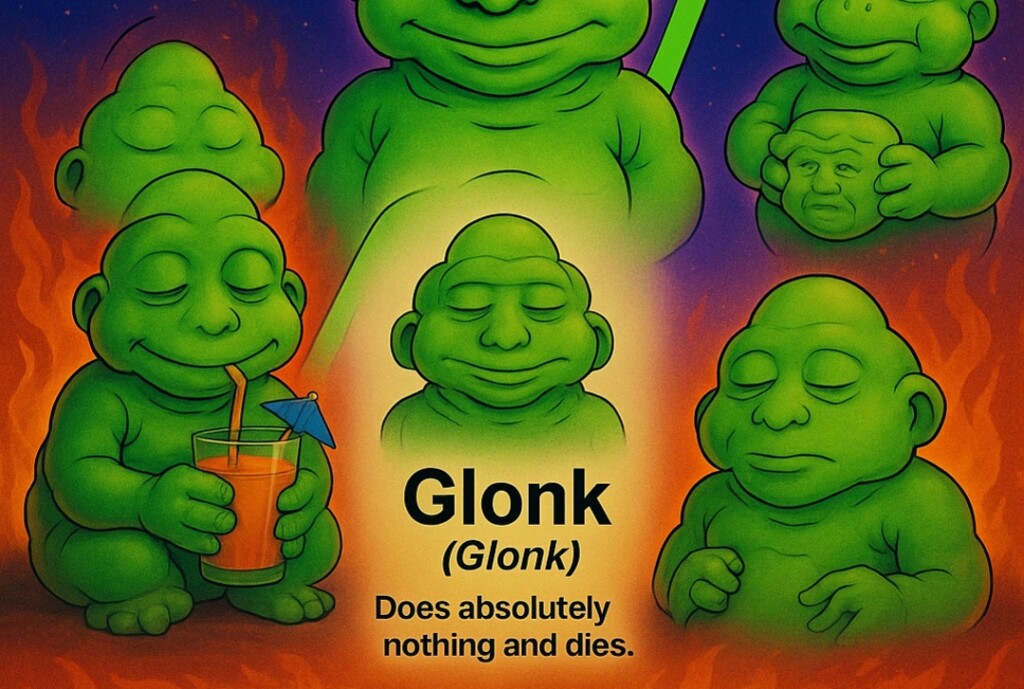In the rapidly changing and speedy world of memecoins, an anti-hero, or rather an apathetic anti-hero, showed up on May 14.
$Glonk, a token whose inspiration could only come from Ricky Gervais’s Flanimals series, has quickly turned into the token level parody of a token that one hopes never gets parodied at the token level. More importantly, it seems to be getting people talking about the next thing on the memecoin agenda: a rivalry (of sorts) between two popular memecoin launch platforms, Pumpfun and LetsBonk.
$Glonk is reaching into Gen Z’s anti-hustle, post-ironic culture. With its absurdist roots and ironic tone, the game is very much a product of this time. Named after a creature that “does nothing and dies,” $Glonk’s nihilistic premise is strikingly relevant in an age when online trends are driven by memes, satire, and cultural detachment.
The Origins of $Glonk and Its Cultural Resonance
Glonk is a character from the satirical world of Flanimals. If I try to describe Glonk, I have to say that Glonk is not an admirable figure. In fact, Glonk does not symbolize ambition or anything close to what modern life demands from most of us. Instead, Glonk is a glorified slacker. He spends his day biting off a tiny bit of a sausage and asking the same stupid question over and over again: ‘What is it?’ When he drops the sausage, he uses his claws to pick it up, each time giving in to his obvious delusion that he has any reason to keep going with that charade. The mindset of Glonk is gaining favor in digital culture, especially with younger users. Although Zers and younger millennials are often criticized for being lazy and unmotivated, such character traits can feel like desirable alternatives to the harmful hustle culture of late-stage capitalism.
$Glonk’s emergence as a meme token directly reflects this shift. Unlike many meme coins that attempt to capture the essence of Dogecoin or Pepe through pure nostalgia or humor, $Glonk has built its appeal through something comedians call existential comedy. It doesn’t just make fun of our financial ambitions; it makes fun of the very idea of trying. And that’s why it’s catching fire.
A Tale of Two Glonks: Pumpfun vs. LetsBonk
The unique situation where two distinct versions of the $Glonk token were nearly simultaneously launched on separate platforms makes for a fascinating spectacle. This has ignited a competition between their respective communities that is quite intense.
The LetsBonk version of $Glonk has clearly taken the lead. It currently boasts a market capitalization of $13 million and has generated $58 million in trading volume in a matter of hours. This version seems to have captured the stronger narrative momentum, likely due to LetsBonk’s user-friendly platform, faster onboarding, and better social media traction.
The Pumpfun version, on the other hand, has built a respectable market cap of $4.9 million with $48 million in volume. It may be the also-ran, but its sturdy community support and the push from its viral marketing keep it a live contender. Traders and enthusiasts argue over which version of $Glonk holds its true spirit, and many hedge their bets by participating in both markets.
$Glonk emerges as a battleground for meme token launch platforms, with the LetsBonk version surpassing $13 million in market cap
On May 14, competition among memecoin launch platforms intensified, with $Glonk becoming the center of attention on both Pumpfun and LetsBonk.
Glonk… pic.twitter.com/QDq5RiyBYZ
— Followin (@followin_io) May 14, 2025
This dual-launch has turned $Glonk into more than a token—it’s now the symbol of a broader battle between two rising memecoin ecosystems. The conflict is shaping up not only in terms of price action but also through social media engagement, influencer endorsements, and community loyalty.
Meme Mania Meets Platform Wars
The triumph of $Glonk underscores an emerging trend within the realm of meme tokens: the need for platforms to act as dynamic launchpads for tokens seeking meme-worthy viral status. Trading in memecoins is no longer solely the province of the memes themselves. And certainly, the platforms on which these memes are born, like Twitter, can have a huge hand in determining their viral nature. But what about the platforms on which the tokens are built? How can (or should) they figure into this conversation?
Yet it also signals a deeper shift. Tokens like $Glonk show that meme culture in crypto is moving on up. It’s no longer just happy-go-lucky mascots or nostalgic payoffs. Now, it’s infused with irony, cultural commentary, and even philosophical undertones. Those are the main components of the new meme token. And if it’s not too early to say this, the token could be the next stage in meme evolution.
Be it a glowing ascent or a declining passage into the ever-expanding archive of memecoins, $Glonk is early on teaching about success in timing and the relatability of internet memes, with a winning dose of chaotic internet culture thrown in. In an epoch of altcoins rapidly coming online, where platforms such as Pumpfun and LetsBonk battle for supremacy, it’s possible—if not probable—that $Glonk will sand its place as one of the first tokens that turned existential apathy into meme-driven profitability.
Disclosure: This is not trading or investment advice. Always do your research before buying any cryptocurrency or investing in any services.


No Comments